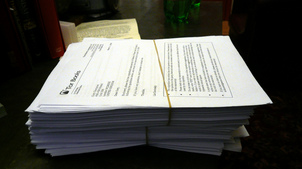|
I've got some news to share today. For the first time in six years, I am about to become a full-time writer again. This is something I've known about for a while, but I've saved this blog post until today so that I could explain properly.
Writing full-time is an unusual step. As I've mentioned before, I've never chosen to go full-time, though I've had the opportunity. To some people this probably seems slightly insane. Why would anyone not want to spend their days working from home in their dressing-gown, making things up and writing them down (as Neil Gaiman puts it)? The truth is, I've always done other things alongside writing, and always chosen to. This was partly because I learned to write that way, in the gaps between the rest of life. And even when I began writing professionally, I felt I was too young to stop learning altogether, so I went on to get my A-levels part-time - and then I realised I could study other writers' books for three years and that this might be quite a good idea, so after another full-time writing stint I went on to university. Which turned out to be one of the best decisions I've made. There, I got quite passionate about teaching, and that led me to train and start work as an English and literacy teacher. There's a strong tradition of writers who have had and benefited from other jobs, which this article by Robert McCrum sums up perfectly: 'There is a lot to be said for writers who don't just write. The literary press is full of the life and work of professional writers, but the English literary tradition is sustained by men and women who did not give up the day job, and led double lives.' Recently, I've been working half the time as a teacher and half the time as a writer. While the teaching has crept over into my writing days more times than I can count, the balance has been manageable enough to complete The Heart at War. The school where I have been working this year is a fantastic place, full of some of the best people I've met. In fact, I don't think I've ever worked with a kinder group of colleagues or a more interesting group of students. There's just one problem - it's too far away from home, by about 30 miles. I began to realise this as the school year went on, and had to make a tough decision. So today I found myself reluctantly saying goodbye to the students who I've got to know over the past year. This is also why I'm only sharing the news now: simply put, I didn't think it was right to tell anyone else before I told them. (They were positive and very understanding about it, once I promised to visit, so all is well as it turns out.) When I leave on Friday, rather than continuing to balance writing with other work, it will be to concentrate full-time on writing. Maybe my perspective has changed over the last few years, but what might once have looked to me like a frightening ocean of time and blank pages began to look like an opportunity. I've got a few ideas for a new book and I know that they are ambitious, different to what I've done before, and need time and space to develop. I decided, during the last few months, that I wanted to give them that time and space. So what does writing full-time mean? Here are a few things I hope it means: - More books: I'm looking forward, after a few weeks' holiday, to picking up the threads of various ideas. - More time to talk to readers: something I've always enjoyed, and want to spend more time doing. - More time to actually meet readers (starting on the 9th-11th August, when I'll be attending Nine Worlds Convention, my first public event as a writer for a very long time!) - More reading time, which is naturally something a writer can never get enough of. - And finally, I might actually stop being terrible at playing the guitar... though somehow I don't think my lack of skill has much to do with my busy lifestyle, unfortunately. Still, I'll try. That's all for now. Thanks, as ever, for your support - it's heartening to be in touch with other readers and writers as I start this new stage of my writing career
0 Comments
In the very beginning it starts with this, a manuscript: When I began writing, a manuscript was a bundle of paper which you posted in a Fedex box. Now, I deliver mine by email (though I usually take a paper copy to my agent, a kind of tradition we've established). The general rule for when to submit it is when you have entered a haze of exhaustion which renders you incapable of doing anything but adding and removing the same comma while feverishly muttering long sections of the book out loud to yourself to 'check the rhythm of the sentences'. Delivering the book is difficult to do. You will have written, rewritten, polished and agonised over this book for probably well over a year - and that's if you are a quick writer. My books now take much longer. You will worry about whether or not it is as good as your other books, as good as it can be, whether your editor will be satisfied with it. But at some point you have to let it go. So you write a friendly email explaining that it's done, maybe give your editor a call to let her know to expect it imminently, and press send. This was what I did, on the 20th of June, with The Heart at War. Then, there is a moment when you don't quite realise the book is finished. Then, you feel a very tentative sense of relief and begin to realise that the labour that has consumed a large part of your energy for a large portion of your life is done. It's probably a good idea to celebrate in some way, despite your exhaustion, because this is an important moment. And also because your family and friends may not have seen you emerge from wherever you write for some time and might actually quite like to see you. And then, you wait. I am at this stage at the moment, and it's a good moment. I'm keeping in touch with my editor, Amy, and generally just enjoying some time to catch up on everything else I've neglected. My editor will spend this time reading the book, making notes and recording her impressions of the draft. At some point in the next couple of weeks we'll arrange a schedule for the editing process. Once that begins, the manuscript is well on its way to becoming a book.
Anything else you would like to know? Just tell me and I'll try to include it here. There were two things that surprised me about the publication process when I began writing.
First, it takes a long time to get a book from manuscript to publication. About 18 months in total is perfectly reasonable for a large, mainstream publisher. Secondly, an author is a very small link in the large and complex network of people who are involved in the publishing process. I have probably worked with 30 people, from cover designers to copy editors, on each volume of The Last Descendants. Multiply that by all my publishers around the world and that's around 540 people directly involved with the fate of a single book. I don't think I am the only author whose first encounter with the publication process was a surprising one. For some reason, publishing is an industry surrounded in mystery. When I talk to people about my job they are shocked by how long it takes to get a book to publication, how many other people work on it, how far ahead my publishers think. There's still a tendency to see a book as something that springs into the world fully-formed, its birth shrouded in darkness (much as I think of a CD, or a film, or a piece of art). The finished nature of the product belies the very serious construction work that has gone into it, and the intricate scaffolding under its surface. A lot of that scaffolding comes from the writer, but they couldn't do it without the expertise of many others. As The Heart at War has just begun the publication process, I thought it would be interesting to record its progress right up to the day of its publication. So I've decided to create a series of blogs on how a manuscript becomes a book. Over the next few months, I'll try to share each episode in the story. This is of course only a single perspective. My books are published by a mainstream publisher, Random House; many authors are published by small presses or get their work into the hands of their readers independently. I have an agent; some authors represent themselves. This book is my third and I was contracted to write it; the experience of submitting a debut novel is very different, as will be the process of submitting my own next book. I hope, either way, that there will be some useful insights for readers who are interested in looking behind the scenes at what it takes to create a book. It's a process I've been fascinated and often humbled by, involving as it does so many people who are just as expert at their craft as the most dedicated of writers, and many different processes without which the book couldn't exist. I'll begin with #1 in this series, 'Delivering the manuscript'. If there's anything you want to see included over the next few months, just let me know. |
Subscribe for updatesArchives
March 2021
|


 RSS Feed
RSS Feed
